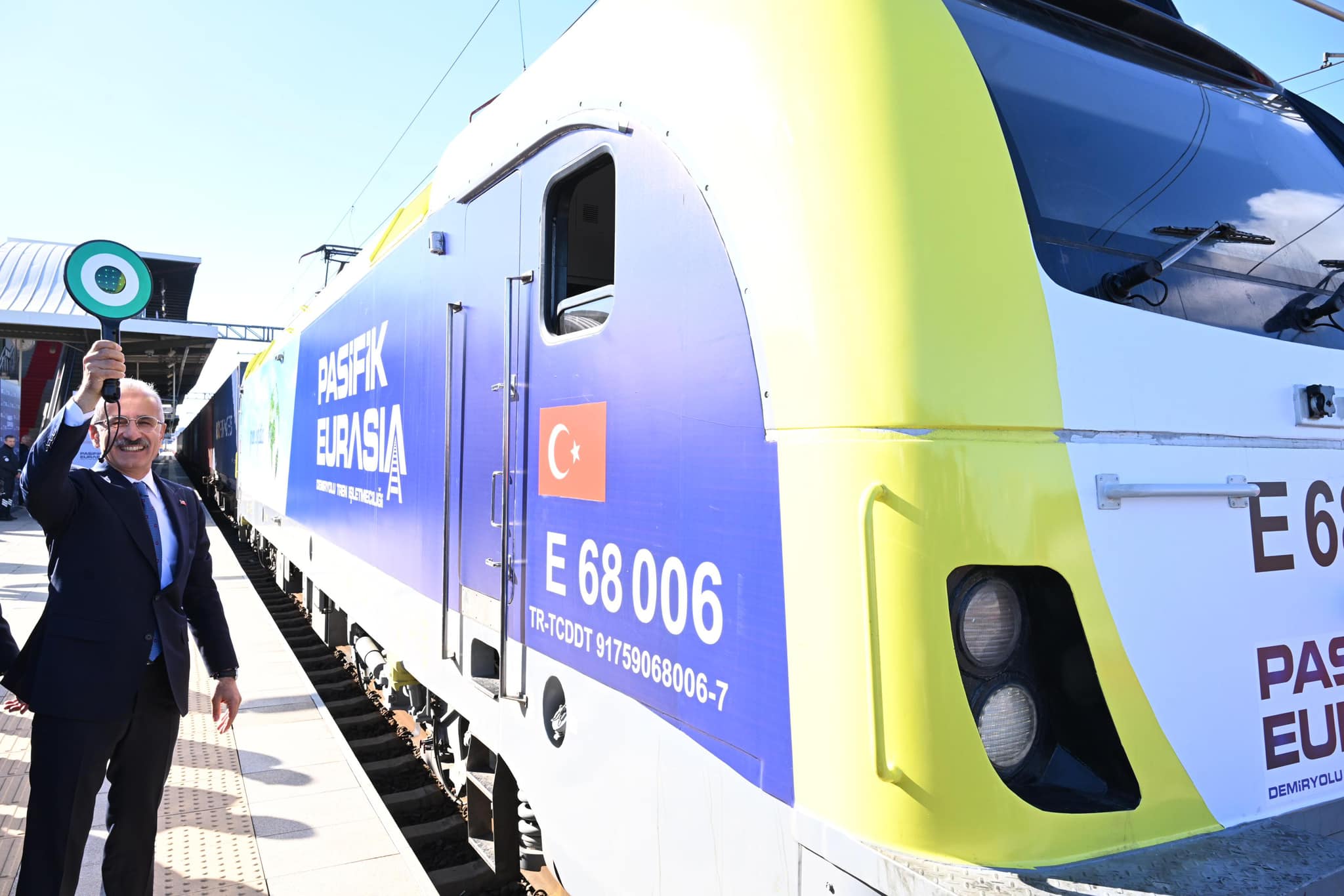
Türkiye’s Minister of Transport and Infrastructure, Abdulkadir Uraloğlu, that the first Istanbul-Budapest freight train will cover 1,549 km in 4 days as country’s “first rail private operator Pasifik Eurasia plans to transport 750,000 tonnes of cargo, equivalent to 22 thousand trucks, with freight worth EUR 600 million with 60 trains each month and 600 trains per year.”
The liberalisation process of rail transport in Türkiye sees Pasifik Eurasia operator achieving a milestone in the development of country’s rail market as it “has obtained the certificate of being the third rail private operator in our country and the first one to provide country’s international rail transport services. The company will operate Istanbul-Budapest freight train which will run 278 km across the country, 406 km in Bulgaria, 634 km on the Romanian network, and 231 kn in in Hungary. The company started the operation of the train on a 4-day journey,” the minister explained.
One of the most important routes Türkiye pays attention is the Silk Road which is considered the shortest, safest, most economical and most climate-friendly railway corridor between the Asian and European continents. “The container trains are transporting important cargo including not only consumer goods, but also the raw materials necessary for the construction sector. The route is of great importance for economy as well as for trade development along the New Silk Road between China and Europe,” the minister emphasized.
9,340 train trips ensured the transport of 1.9 million TEU between China and Europe in 2023 and this volume continues to increase along the route. “We have started a new era in railways so that the opportunities provided by the strategic geographical location of our country, which acts as a bridge between Asia and Europe, can turn into economic and commercial advantages,” Minister Uraloğlu said.
The Baku – Tbilisi – Kars railway route, which started operating in October 2017 gave a new direction to railway transport. “Considering the approximately 8,693-km distance between China and Türkiye, containers reach Türkiye from China in 12 days via this line and from China to Europe in 18 days using the Marmaray railway. The first train on China – Türkiye – Europe route departed from China in October 2019 and reached Prague, Czech Republic in 18 days,” Uraloğlu explained.
Block train container transport between Türkiye and China continued from different points in Türkiye using the Baku – Tbilisi – Kars route and a total of 67,281 TEU and more than 1.5 million of cargo have been transported using the BTK railway line since its opening.
The minister said that the volume will increase in the next coming period and will achieve Türkiye’s medium term goal of 200 block trains to provide regular services each year and long-term objective to reach 1,500 block trains delivering regular services on the China – Türkiye – Europe route, using the Middle Corridor and Baku – Tbilisi – Kars routes. The transit time from Chian to Türkiye will be reduced by 2 days, from currently 12 to 10 days.
To develop its potential, Türkiye will implement the Yavuz Sultan Selim rail Bridge project which “attracted intense interest from international financial institutions as it is one of the most important projects for transit. The World Bank in particular has a close interest. I believe that we will take concrete steps to start the construction process of this project in the first months of 2025,” the minister said.
The Yavuz Sultan Selim Bridge railway project, also known as the Third Bosphorus Bridge in Istanbul, will be one of the longest and widest bridges of this king in the world and it is expected to cost USD 3 billion. The existing Yavuz Sultan Selim road bridge, part of the North Marmara Highway, has been opened in 2016. The rail project to be realised includes a double track bridge that will ensure the connection between Edirne and Izmit and will also provide the link between Asia and Europe.
Türkiye has developed its rail sector and modernised and significantly expanded its network and to open it to free competition through liberalisation process, many measures had to be taken, many obstacles had been approached and removed and a strong railway infrastructure had been created. “We considered railways as state policy and determined it as a priority sector. We added approximately 3,000 km to the rail network, of which 2,250 km high-speed lines,” Abdulkadir Uraloğlu said.
The rail network of Türkiye was 11,000 km in 2003, and currently has a length of 13,920 km. The country plans to increase its rail network to 17,287 km by 2028 and to 28.590 km by 2053. “In addition, in line with our transport and logistics master plan, we plan to reduce the share of road passenger and freight transport from 72% to 57%, while increasing the share of railway freight transport from 5% to 22%. We aim to increase the annual average freight transport by railways from 32 million tonnes to 448 million tonnes,” the minister explained.
This will determine the development of rail freight market where the private companies will have an essential role. “As the Ministry and the relevant general directorates, we are working to create a railway market with fair competition conditions and a healthy functioning structure. However, at this point, we will no longer expect everything from the state. From now on, private railway train operators will also take responsibility in expanding the railway sector. Together, we will bring our sector to a stronger structure. I hope that Pasifik Eurasia’s first Istanbul-Budapest freight train will be a start for many more services,” the minister concluded.
Share on:






